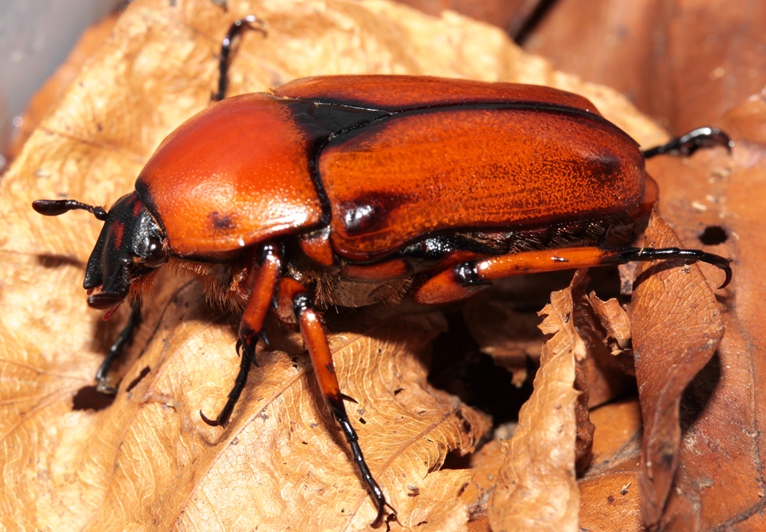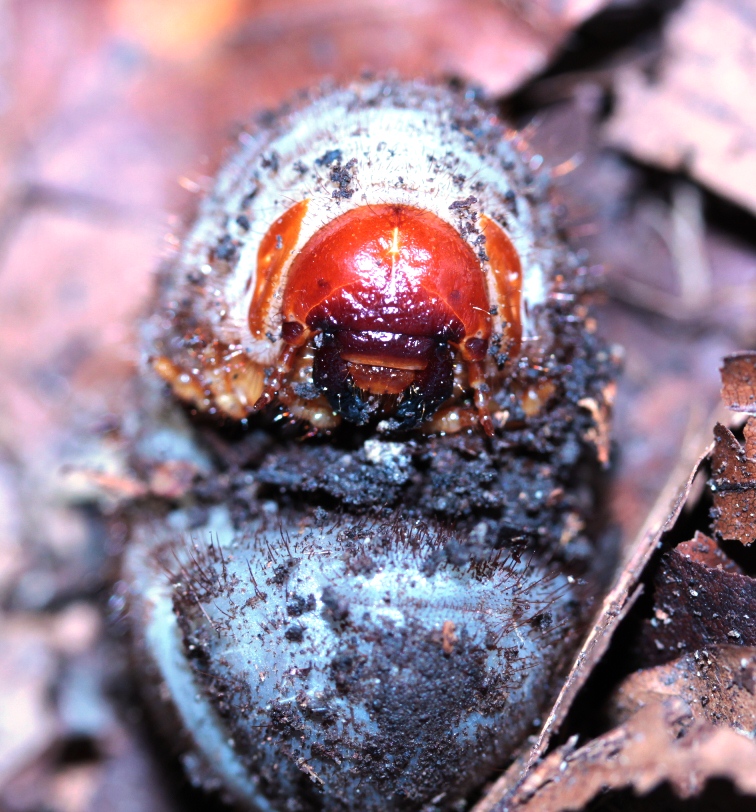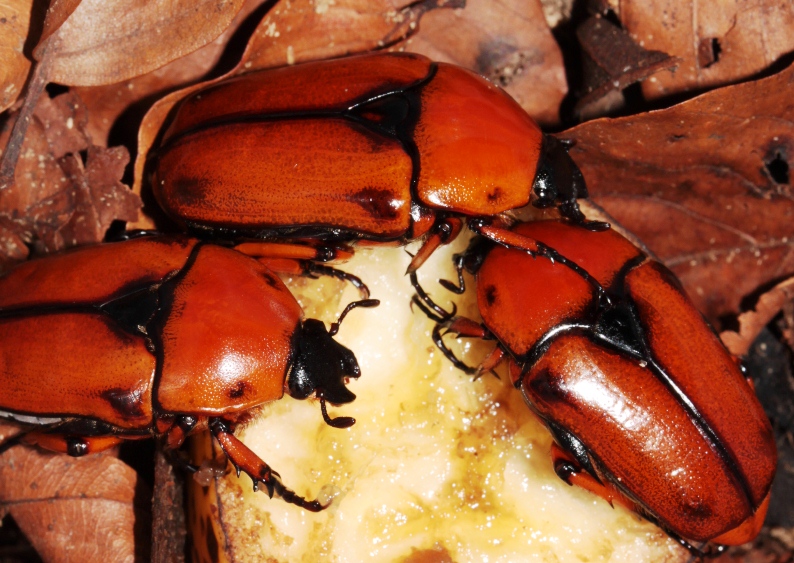Dilochrosis atripennis is a medium-sized flower beetle from Australia. Its size in breeding is around 4 cm. It is considered an easy to breed species. However there are a few points which make this species stand out from the standard breeding process, for instance of Eudicella gralli. I suspect that the original stock of Dilochrosis atripennis came into the hands of European breeders through the Australian insect farm – at least they were the first to offer them. Dilochrosis atripennis is one of the beetle species that have been in the hands of breeders for a very long time, I think there have been continuous breedings for more than 15-20 years now.
I received my larvae from Jahn OLDRICH, as L2 about a year back. They were growing rather slowly, but steady. This might have to do with the temperatures in my breeding room, which are normally around 20-24 degree Celsius. I had 3 larvae per 5 liter container and fed the larvae with a mix of leaf compost and white rotten wood. I noticed that the larvae seem to prefer drier substrate. From a vendor of Dilochrosis balteata, whom I met in Prague, I learned that this species needs very dry substrate in order to thrive. I guess the same is true for Dilochrosis atripennis.
My larvae took almost 12 months to start pupation. The cocoons they created were really delicate. However, I managed to hatch out a few males and one single female. I noticed quite often in recent breedings that the gender ratios were really uneven. I think that this might be a result of temperature, maybe like some reptile species, where the incubation temperature of the eggs determines the gender of the hatchling. It might also be a result of inbreeding. To ease pupation, next time I will add a large piece of white rotten wood into the larval container.
I prepared a box with flake soil and leaf compost for my small group of imagines.These are really attractive beetles. I heated the box with a normal desk lamp and had air temperatures of around 29 degree Celsius in the daytime and around 22 degree Celsius at night. The single female was quite productive, and I managed to get a total of around 40 eggs. It was quite interesting to see that the eggs really become large prior to hatching – easily 4 mm in diameter. I have seen similarly large eggs only in Agestrata until now. My F1 larvae are L1 at the moment, but growing much faster than the previous batch – probably because I keep them at higher temperatures than before.
I think the main key to success with this species is to make sure the substrate does not get too humid. I have a lost a few pupa of Dilochrosis atripennis due to a bit too much humidity during pupation. Overall, I think Dilochrosis atripennis makes for an interesting addition to beetle breeding – considering that there are hardly any other Australian species in our breedings, apart maybe from Trichaulax macleayi.
That’s it so far. If you have anything to add, please let me know.




Price List:
-Goliathus cacicus 81mm A1 $66 pair
-Goliathus cacicus 82 mm A1 $80 pair
-Goliathus cacicus 84 mm A1+ $90 pair
-Goliarhus cacicus 70 mm A1- $35 pair
-Goliathus cacicus 81 mm A1 $55 pair
-Goliathus orientalis 75 mm A1+ $20 pair
-Goliathus goliathus apicalis 98 mm A1+ $45 pair
-Goliathus goliathus 94 mm A1+ $45 pair
-Goliathus goliathus conspersus 70 mm A1+ $45 pair
-Goliathus goliathus conspersus 86 mm A1+ $80 pair
-Goliathus goliathus conspersus 79 mm A1+ $60 pair
-Goliathus goliathus albatus 78mm A1+ $65 pair
-Goliathus goliathus conspersus 94 mm A1+ $90 pair
-Goliathus goliathus conspersus 87 mm A1+ $75 pair
-Goliathus goliathus quadrimaculatus 94 mm A1 $90 pair
-Goliathus goliathus albatus 90mm A1+ $90 pair
-Goliathus goliathus undulus 74mm A1+ $80 pair
-Goliathus goliathus quadrimaculatus 70 mm A1+ $60 pair
-Goliathus goliathus conspersus 79 mm A1 $60 pair
-Goliathus goliathus regius 104mm A1 $90 pair
-Goliathus goliathus regius 98mm A1 $80 pair
-M.torquata 75-82mm A1+ $60 pair
-Syefanocrates preussi 45mm A1+ $25 pair
-Chelorrihna kraatzi 65mm A1+ $25 pair
-Pachnoda fissipuncta A1+ $10 pair
-Pachnoda marginata peregrina A1+ $10 pair
-Eudicella euthalia nyassica A1+ $11 pair
Goliathus Goliatus quadrimaculatus $75 pair
Goliathus Goliatus conspensus $60 pair
Goliathus Goliatus undulus $65 pair
Chelorrhina kraatzy marlenae $75 pair
Chelorrhina kraatzy moser $45 pair
Chelorrhina kraatzy dessins confuents $55 pair
Fornasinius aureosparsus.Van de Poll $35 pair
Stephanogrates preussi. Kolbe $40 pair
Stephanogrates preussi. Kolbe f ignita $65 pair
Stephanogrates preussi. Kolbe bicolour $55 pair
Eudicella morgani camerounenis Allard $35 pair
Eudicella gralli schultzeorum $45 pair
Corynotrichius bicolour $30 pair
Taurhina longiceps camerounensis $85 pair
Psuedinca Camerounensis $75 pair
Coenochilus calcartus (antcetonia) $35 pair
Coenochilus maurus (antcetonia) $30 pair
Coenochilus tuberculicollis (antcetonia) $45 pair
Pseudinca camerounensis $65 pair
Pseudo-charriesthes nobilis $55 pair
Glenea 22-maculata $40 pair
Olenecamptus triplagiatus $42 pair
Chariesthes bella $35 pair
Anomotoma lesnei $66 pair
Brancheocentrus duvivieri $54pair
Cantharocnemis pilicipennis $35 pair
Ceratocentrus spinicornis $38 pair
Macrotoma gracillipes $20 pair
Navosomopsis feishtameili $28 pair
Phyllognathus burmeisteri $30 pair
Baraeus Taeniolatus $55 pair
Geloharpya murrayi $45 pair
Neoclosterus argodi $30 pair
Cheilacanthus severini $38 pair
Neoclosterus lujae $36 pair
Zographus regalis cuprea. Breuning $34 pair
Get through the list and send in the order as well as the delivery
details now. Send:
State
City
Zip-code
Street
Block #
House #
Full names
Contact #
We will send you more details when we get the order as well as the
Hello Friend
I have many different species of beetles for sale low price/whole sale for more information write me at; africawildlife1@gmail.com
Thanks
Leonard